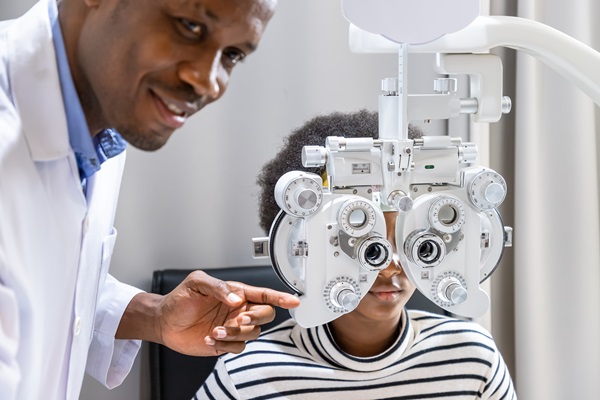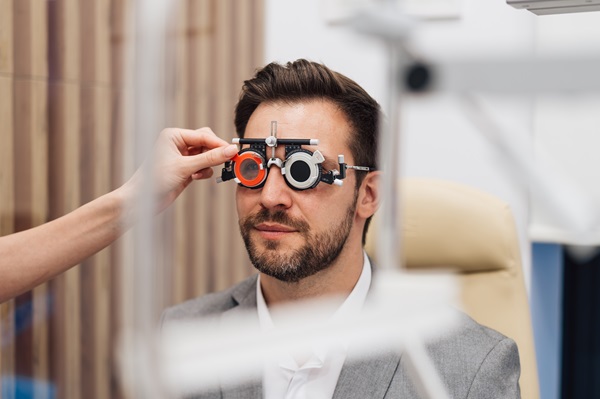How Often Should You Visit Your Optometrist?

Regular visits to the optometrist are an effective way to maintain good vision and eye health. How often "regular" is depends on several factors, however. Knowing the right recommendations can save patients money and time and help them catch potential health issues as soon as possible.
A general guide to visiting an optometrist
The American Optometric Association (AOA) recommends that patients, regardless of whether they wear glasses or not, get a routine eye exam every one to two years. This is to help patients detect eye disease and deteriorating vision early on, thereby reducing the overall health impact these conditions may have. Here is why seeing an optometrist every one or two years is an important part of maintaining one's eye and overall health.
Getting glasses or contact lenses
Annual eye exams help patients who need vision correction, such as prescription glasses or contact lenses, ensure their prescription stays up to date. For these patients, the optometrist will check their current prescription against the results of their vision test. If there are any changes, they may follow up the vision test with a refraction test to update their prescription. This is part of the eye exam where the optometrist will ask the patient to read letters off an eye chart through different lenses.
Updating the patient's prescription is not the sole reason for a routine exam. The optometrist will also look for signs of common eye diseases, such as cataracts or glaucoma. They can then recommend treatment to preserve one's vision, from medication to laser therapy and other surgeries.
Catching eye diseases before they progress
Like any other type of disease, some demographics are at a higher risk of developing eye diseases. Per the AOA, patients at risk for these diseases should visit the optometrist annually. This includes but is not limited to those who:
- Wear contacts
- Have a personal history of eye injury
- Have a family history of eye disease
- Have received refractive surgery (e.g., LASIK)
- Take prescription medications that create an increased risk of eye disease
Caring for older people's eyes
According to the AOA, patients who are 65 and older should try to see an eye doctor every year. Aging is a gift, but unfortunately, it can also bring on age-related eye problems. For some, this is as harmless as slowly declining vision. They may have trouble reading menus at restaurants or watching television. However, there is also the possibility of developing age-related macular degeneration, glaucoma, or cataracts. Catching these issues early on allows for early and, potentially, more successful treatment.
Patients without glasses or contacts
Just because a patient does not currently wear glasses or contacts or is not at risk for developing eye disease does not mean they are safe to skip eye exams. As mentioned, regular eye exams are an important preventive measure. For example, vision loss may start so slowly that a patient does not notice it has deteriorated until they try wearing glasses for the first time. Getting prescription glasses sooner rather than later can prevent the patient from straining their eyes, leading to headaches and worsening vision.
Further, a patient without vision problems may still develop an eye disease. The optometrist will check for these diseases and slow their progression when possible.
Signs you should book a checkup visit
There are some signs and symptoms for which a patient should not wait until their next routine eye exam to consult an optometrist. This is because the issue may be an untreated and undetected eye disease. It is important to seek the diagnosis of these diseases as soon as possible to provide proper treatment and prevent irreversible vision loss.
Patients should not panic, however. The issue may be something minor, such as an incorrect prescription. For example, too weak of a prescription may cause headaches as the patient habitually straining their eyes to see. Other common signs to book a checkup visit over include:
- Eye pain
- Blurred vision
- Double vision
- Floaters
- Flashes
- Spots
- Dry eyes
- Watery eyes
- Light sensitivity
- Trouble seeing at night
- Difficulty using screens, including computers
Note that there are some cases in which a patient may need immediate medical help for a symptom listed above. A sudden onset of double vision may indicate a stroke or tumor. If this occurs, call 911 for emergency assistance.
Call today to schedule your appointment
Has it been a while since you have had a routine eye exam? Our team at Texas Optical is here to help. Contact our Dallas office at (214) 771-7333 to schedule your next appointment.
Request an appointment here: https://www.texasoptical.net or call Texas Optical at (214) 771-7333 for an appointment in our Dallas office.
Check out what others are saying about our services on Yelp: Read our Yelp reviews.
Recent Posts
A contact lens exam is slightly different from an eyeglass prescription exam. Though both correctives are great for helping you see clearly, contact lenses can be a better fit for certain individuals, such as those who live more active lifestyles. Take a closer look at what you can expect during your upcoming examination.A general eye…
Regular eye exams are crucial for maintaining overall health for people of all ages. By establishing a relationship with an optometrist, you not only protect and enhance your vision but also safeguard against potential health issues. This comprehensive guide highlights the benefits of maintaining a connection with our office, a practice that benefits everyone in…
Your eye health is an essential part of your overall health. Regular checkups with an eye doctor can often prevent many eye issues and complications, catching them in their early stages. Here are three key signs that it might be time to visit an eye doctor.Eye discomfort can appear in many ways. While occasional eye…
Proper vision care can address eye strain and reduce its uncomfortable symptoms. An optometrist will also help to prevent future eye strain. Thus, while there are many ways to strain your eyes, there are many changes you can make to give them a break.Straining the eyes can bring all sorts of symptoms. As a result,…


